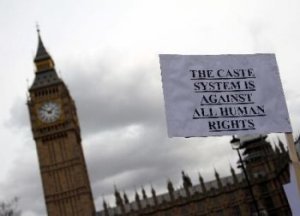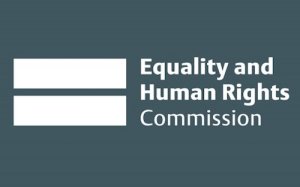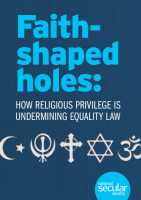Bigotry based on the idea of 'caste' has no place in modern Britain.
We want to see those at risk of caste discrimination protected by UK law.
'Caste' systems are rooted in ancient religious and cultural beliefs. They are imbued with inequality and discrimination, and are wholly incompatible with human rights.
There are an estimated 50,000 – 200,000 people in the UK who are regarded by some as 'low caste' (sometimes known as 'dalits') and at risk of caste discrimination. There is evidence of caste-based discrimination and harassment present in employment, education and in the provision of services.
Caste-based prejudice and discrimination is a gross violation of human rights and must not be tolerated. All individuals have the right to protection against discrimination on the basis of their caste or perceived caste, in the same way that they do on the basis of race or gender
Our equality laws do not explicitly deal with the issue of caste, meaning victims of caste discrimination have to use unclear and precarious case law to secure justice. Both parliament and the United Nation Human Rights Council have called on the government to explicitly outlaw caste-based discrimination, but it has delayed doing so for years.
It's time to outlaw caste discrimination.
Take action!
1. Have you experienced caste discrimination? Report it!
The Dalit Solidarity Network's "everyday casteism" campaign is cataloguing instances of casteist behaviour, including incidents of discriminatory or caste hate speech behaviour, experienced on a day to day basis by people perceived to be 'lower' caste in the UK.
If you have been affected by caste discrimination, please consider reporting it to them.
You can also report caste discrimination to the Anti Caste Discrimination Alliance here.
2. Write to your MP
Tell your MP that it's time to outlaw caste discrimination.
3. Join the National Secular Society
Become a member of the National Secular Society today! Together, we can separate religion and state for greater freedom and fairness.
Latest updates
NSS: government not doing enough on caste discrimination
Posted: Thu, 2 May 2019 18:13
The National Secular Society has warned that guidance on the relationship between 'caste' and the 2010 Equality Act "does not do enough" to tackle the problem of caste discrimination.
The unpublished guidance, seen by the NSS, is due to be distributed by the Government Equalities Office with the aim of helping employers and organisations handle complaints regarding caste discrimination.
The guidance follows the government's announcement in 2018 that it would not explicitly recognise caste-based discrimination under the Equality Act 2010.
The announcement defied a formal UN recommendation to legislate "in accordance with the UK's international human rights obligations" and was criticised by the Equality and Human Rights Commission.
The latest guidance says that the existence of caste discrimination is "strongly contested" and refers to instances of caste discrimination as "alleged". It cites examples of "alleged" caste discrimination including a social services carer who refused to bathe a 'low caste' woman, and a worker who refused to clean his own spillage because he said a 'lower caste' employee should do it.
Research published on the government website has estimated that at least 50,000 (and perhaps in excess of 200,000) people living in the UK are regarded by some as 'low caste' and at risk of caste discrimination. The research found evidence of caste-based discrimination, harassment and bullying present in employment, education and in the provision of services.
The guidance says that while caste is not specified as a protected characteristic in equality law, it may "in some circumstances be seen as an aspect of a person's ethnic origins", which is included in the protected characteristic of 'race'.
However, the guidance adds that a previous case that recognised caste as an aspect of race is not "a definitive statement of whether caste is or is not within the scope of the [Equality] Act".
It says complaints about caste discrimination "must be taken as seriously" as complaints about discrimination because of skin colour or nationality. It also gives details on what actions potential victims of caste discrimination can take.
The NSS campaigns for caste-based discrimination to be explicitly recognised as a form of discrimination under UK equality legislation.
Megan Manson, campaigns officer at the NSS, said: "Caste discrimination is very poorly understood in the UK, so guidance that helps to highlight the problem is welcome. The guidance rightly says employers must take reports of caste discrimination as seriously as reports of other forms of discrimination.
"However, this guidance does not do enough to tackle the problem; without specific legislation to protect those affected by caste discrimination, the help that this guidance provides is very limited. There will continue to be victims of caste discrimination who are unable to effectively seek justice due to the vagueness on caste discrimination in equality law, and the prohibitively expensive nature of relying on uncertain case law.
"It is also disappointing that the guidance does not fully acknowledge that caste discrimination exists. Referring to the existence of caste discrimination as 'strongly contested' is no doubt a bid to appease religious groups that want to deny the problem exists, or even retain social structures that give them privilege.
"Until the government fully acknowledges caste discrimination is a genuine social problem, we are unlikely to see the legislative changes desperately needed to protect people from unequal, unfair and unjust treatment."
Meena Varna, director of the Dalit Solidarity Network UK (DSN) which helps those affected by caste discrimination, called the guidance "very confused".
She told BBC Radio 4 that DSN would prefer "specific legislation to protect victims of caste discrimination."
She said the guidance may eventually be "of some use" to back up legislation, but added that it could not replace "any form of legislative protection".
She also said the guidance is "not totally clear" and "not helpful to even the people they're saying it's for".
Varna was shortlisted for the NSS's 2018 Secularist of the Year award for her work tackling caste-based discrimination.
Satish Sharma, a trustee of the National Council of Hindu Temples, told BBC Radio 4 the guidance should use the word 'class' rather than 'caste'.
He said the "Hindu community" believes "there are certain general characteristics which are stronger in some people than there are in other people". He claimed that using the word 'caste' is an "attempt to denigrate" Hindus.
But the guidance says there are "significant differences" between caste and class, including the perception that class is connected to "an individual's education, wealth or occupation" while caste is connected to "an individual's birth and decent", meaning it is "difficult or impossible" to change caste.
The National Council of Hindu Temples is a registered charity that promotes "the advancement of Hindu religion". It has been subject to multiple investigations by the Charity Commission for England and Wales for appearing to endorse political parties and hosting a speaker who has promoted extremist nationalist views.
Megan Manson added: "It is positive that the guidance does not conflate 'caste' with 'class', as some Hindu groups have demanded."
EHRC rebukes government over failure to act on caste discrimination
Posted: Sat, 28 Jul 2018 07:06
The Equality and Human Rights Commission has criticised the government's failure to legislate on caste discrimination, in a move the National Secular Society has described as a "serious rebuke".
The government recently announced that it would not explicitly recognise caste-based discrimination under equality legislation. At the time the NSS said the decision showed "callous disregard for victims".
The Equality and Human Rights Commission has now told The Hindu that the government has "missed a crucial opportunity" and left victims of caste discrimination with "limited legal protection".
"Victims of caste discrimination will continue to have limited legal protection by the government ruling out a change in the law and restricting the scope of protection to what can be interpreted through case law.
"The government has missed a crucial opportunity to improve legal clarity and has taken a step back by looking to repeal the duty to include caste as an aspect of race in the Equality Act 2010. This is inconsistent with the UK's international obligations to provide for separate and distinct protection for caste in our legislation.
"While we welcome the government's commitment to produce guidance for employers, service providers and landlords on the sort of conduct that would be unlawful under the Equality Act, it does not replace the need for separate and distinct protection against caste discrimination in the law."
The EHRC is an independent statutory body with the responsibility to encourage equality and diversity, eliminate unlawful discrimination and protect and promote the human rights of everyone in Britain.
The UN has also repeatedly called on the government to pass legislation as a treaty obligation. In 2013 parliament ordered the government to legislate, although the government has now said it will invite parliament to repeal this duty.
The NSS's chief executive Stephen Evans said the government should reconsider its position in light of the criticism.
"Theresa May should take heed of this serious rebuke and think again before failing to honour both our international human rights obligations and our moral obligation to protect those in our society vulnerable to this form of discrimination.
"Refusing to take notice of both the UN and the public body set up to enforce compliance with equality and human rights obligations seriously tarnishes the government's human rights record. It also illustrates the strength of the vested interests that don't want to see legislation to outlaw caste discrimination introduced."
In 2010 research from the National Institute of Economic and Social Research found evidence of caste-based discrimination, harassment and bullying in employment, education and in the provision of services. The research estimated that between 50,000 and 200,000 people living in the UK were at risk of caste discrimination.





